
What do those three things have in common, you ask? They all live alongside one another in that world of simple economics called 'supply and demand'. Not only is the demand for beef increasing, the demand for its number one food source is skyrocketing. All of this is occurring at the same time that our cattle herds are dwindling, and our domestic grain stockpiles are lower than they've been since 1974.
I reported about the rising costs of pork and brisket back in April of last year, but they just keep rising. On a local level, pitmasters like Billy McDonald of Mac's have seen their wholesale brisket prices go from $1.86 in December of 2010 to $2.23 in the past few weeks. The folks at Lockhart Smokehouse were paying $2.15/lb in their first week, and it's only getting more expensive. Since last year at this time, beef prices have risen 9.7% while retail pork prices are up 9.9%. Given that brisket is a cut that loses +/- 30% of its weight during smoking, the effect of a spike in the cost of the raw slab is exaggerated when comparing it to the weight of the finished product. Brent Deen of Eddie Deen's Crossroads BBQ in Arlington said they've been able to control the price of their raw products through price hedging. While their competitors are paying over $2.15 or more per pound, the Deen's are locked in at $1.90 per pound with their supplier. It was gamble that been paying big dividends to the company lately.
So what's responsible for all of these high prices? The blame can't be pinned on one source, but a huge factor is simply low domestic supply. Cattle are fattened on a diet that consists of mostly corn, so as the price of corn rises, the cost to fatten cattle increases. Last year those high corn prices caused many ranchers to send a higher than normal portion of their herd to market. They wanted to not only cash in on the high beef prices, and also decrease the amount of corn they needed to buy to feed those herds, thus causing an overall dip in the country's supply of beef. A higher foreign demand has also had a dramatic effect on our domestic supply of beef. President Obama convinced South Korea that mad cow disease is but a distant memory, so they have reestablished their American beef imports. More importantly, the USDA estimates Chinese imports of pork will gain 5.7 percent in 2011 and beef purchases will advance 43 percent. That's some expensive brisket.
Ethanol is ballyhooed as the country's savior in the fight against foreign oil. Unfortunately, ethanol is not only a zero net energy source (it takes, on average, 1 gallon of gasoline to create 1 gallon of ethanol), but it also effects our domestic food prices. With about 39% of the domestic corn crop going to ethanol, it just follows the most basic rules of economics that the cost of feed corn to ranchers and feed lots is increasing rapidly. Grain futures rallied this past month to the highest since 2008 on the Chicago Board of Trade, and over the past year, corn specifically surged up 95 percent.
Given the lowered supply of beef, increased demand from foreign markets, and increased demand on our corn crop to fuel our oil addiction, it's no wonder the price of brisket is rising. No matter for me, I won't be making it a habit to order chicken regardless.
- BBQ Snob











7 comments:
As a fellow BBQ enthusiast I certainly feel the pain of rising beef prices for the pitmasters. However, using corn (and the associated loads of antibiotics) to fatten our cattle is not the environmentally sustainable solution. Production of grain-fed animals requires 8 times as much fossil-fuel energy as the production of plant protein. As much as I love brisket, Americans as a whole need to curb their intake of red meat, if nothing else for their own health.
I can't smoke beans, donnacooks! I think you might have wandered onto the wrong blog? haha
Great piece Daniel, thanks. I used to always get brisket on sale for 99-cents a pound but you never see it on sale anymore. Gonna be tough for all these new que joints to survive....
Ethanol is, and has always been, a terrible "solution" to our reliance on gasoline. I don't want to start sounding partisan, so I won't go into who I blame for this issue. I will just say that the whole idea of ethanol is incredibly short-sighted, and based off an environmental overreaction.
As long as it's smoked right, I'll bite the bullet and pay whatever it takes! I'm more addicted to smoked meat than the country is to oil.
On the subject of ethanol, no one ever mentions the lower mpg it generates, engine damage it can cause, or the fact that it is a deadly poison that is water soluable (unlike petroleum). Feed that corn to cows!
Great article. It seems like the quality of the available supply of briskets could of dropped as well
Interesting post, but no mention that high quality beef is not fed corn in the first place. Cows are supposed to eat grass, not corn. Does anyone know of a good BBQ place that serves grass-fed beef?
Post a Comment